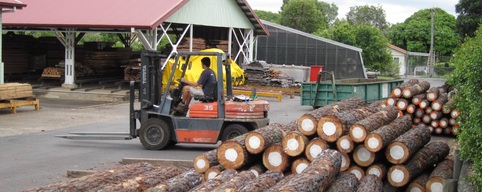

The United Kingdom has experienced a notable surge in wood consumption, reaching 42.4 million cubic meters in 2023. This significant level of consumption establishes the UK as the second-largest net importer of forest products globally, trailing only behind China. Despite a robust appetite for wood, the domestic supply falls short of satisfying this demand, as the UK produces only around 10 million green tonnes of roundwood annually. This discrepancy between supply and demand presents significant challenges and raises questions about sustainability and resource management.
The UK's reliance on imported wood stems from an inherent limitation in its domestic wood production capabilities. With just 10 million green tonnes of roundwood produced each year, the nation finds itself unable to meet its considerable demand through local sources alone. As a result, a substantial proportion of the wood consumed in the UK must be imported, leading to a significant dependency on international forest products.
This challenge is compounded by projections indicating a 78% increase in timber demand by 2025. This demand surge is predominantly driven by two key sectors: construction and biomass. The construction sector, known for its voracious use of timber, continues to expand, requiring vast amounts of wood for various building projects. Simultaneously, the biomass industry is witnessing growth as it endeavors to provide energy solutions labeled as "sustainable."
However, this industry's reliance on natural resources has not escaped criticism. While biomass is often marketed as "clean" energy, due to its renewable nature, the extensive use of wood— a finite resource— has sparked concerns about its true sustainability. Questions have arisen about whether the environmental impact of biomass energy truly aligns with the UK's commitments to sustainability and ethical practice on the global stage.
As demand in these sectors continues to accelerate, the gap between domestic supply and national consumption is expected to widen, necessitating increased imports to fill the void.
One of the most notable aspects of this growing demand is the anticipated rise in wood pellet imports. These imports are forecasted to rise significantly in order to maintain the UK's energy supply and meet the growing demand from the biomass industry. Even as the UK advocates for sustainability and ethical resource management internationally, this reliance on imported wood pellets raises questions about the synergy between its international stance and domestic energy practices.
Balancing these competing interests and commitments presents a substantial challenge. How the UK navigates its wood consumption—balancing imports with domestic production, managing its energy demands, and maintaining its sustainability pledges— will continue to be a vital subject of discourse and action in the coming years. The choices made will not only impact the domestic market but also its relationships and responsibilities on a global stage.



